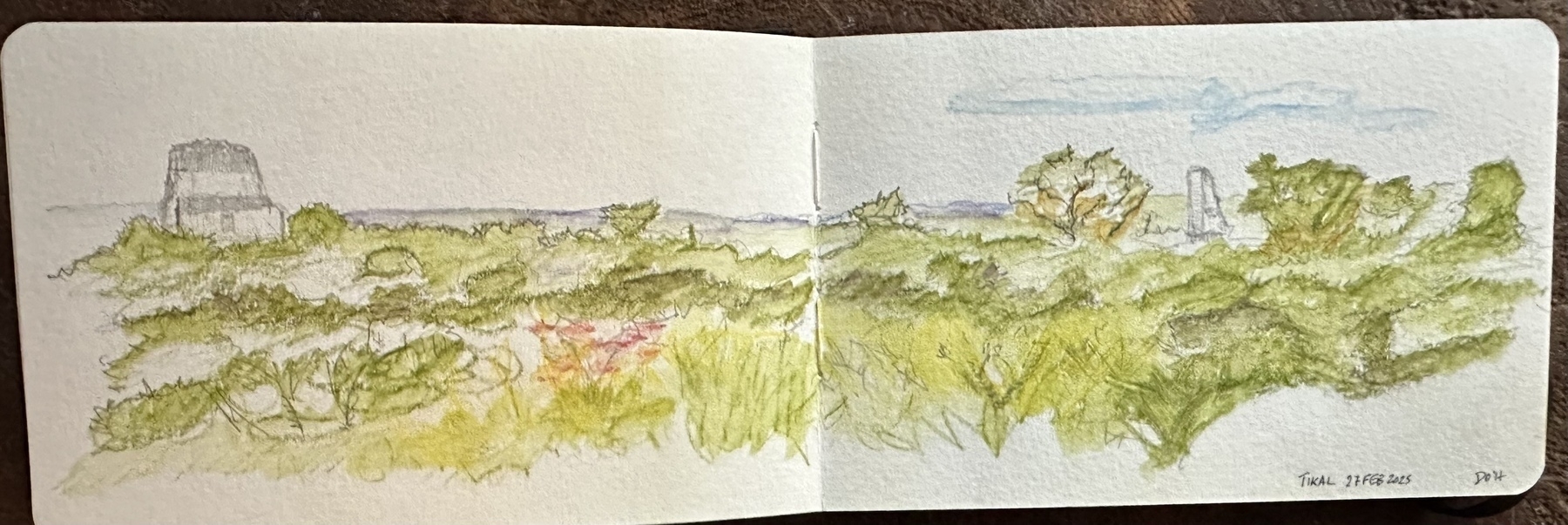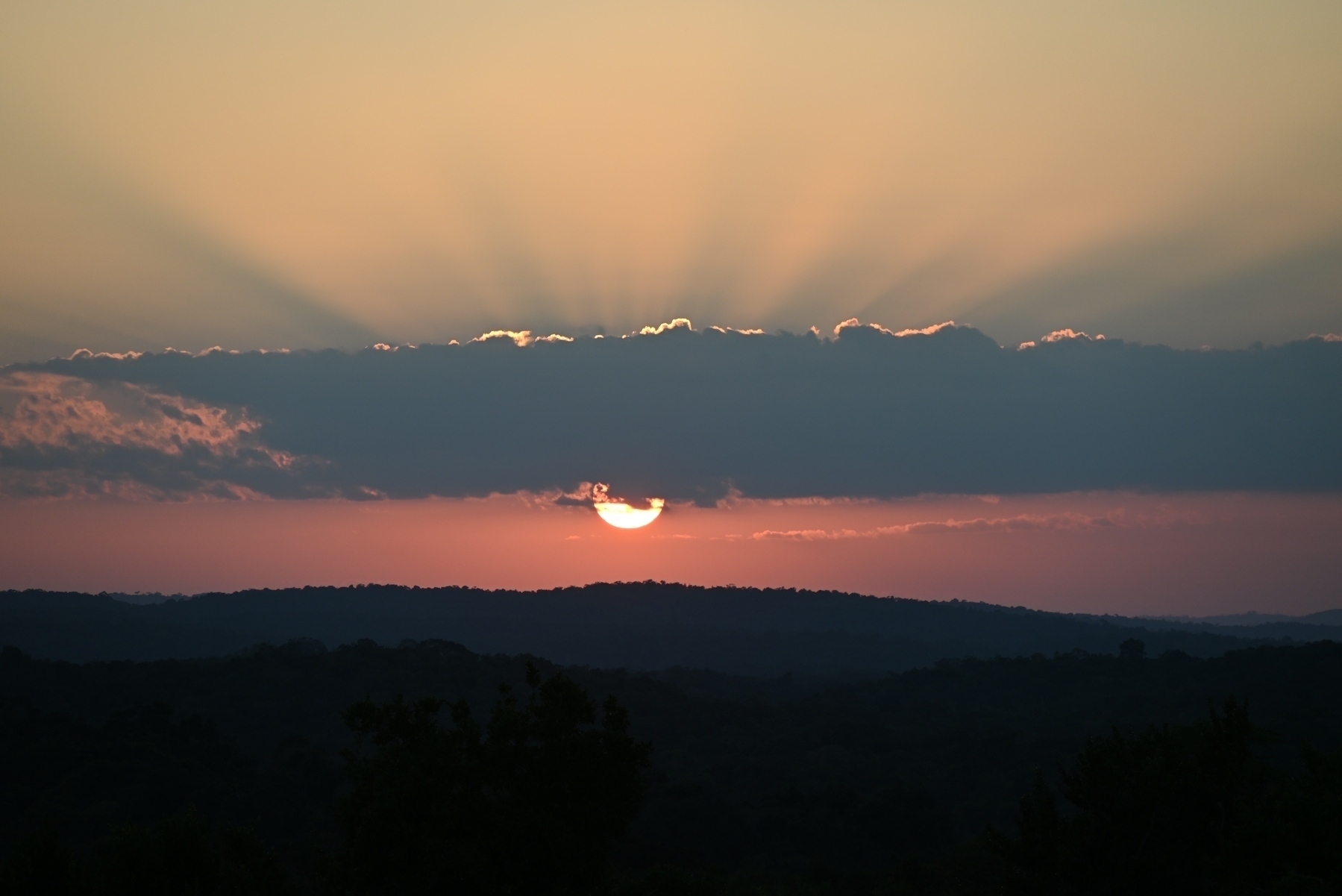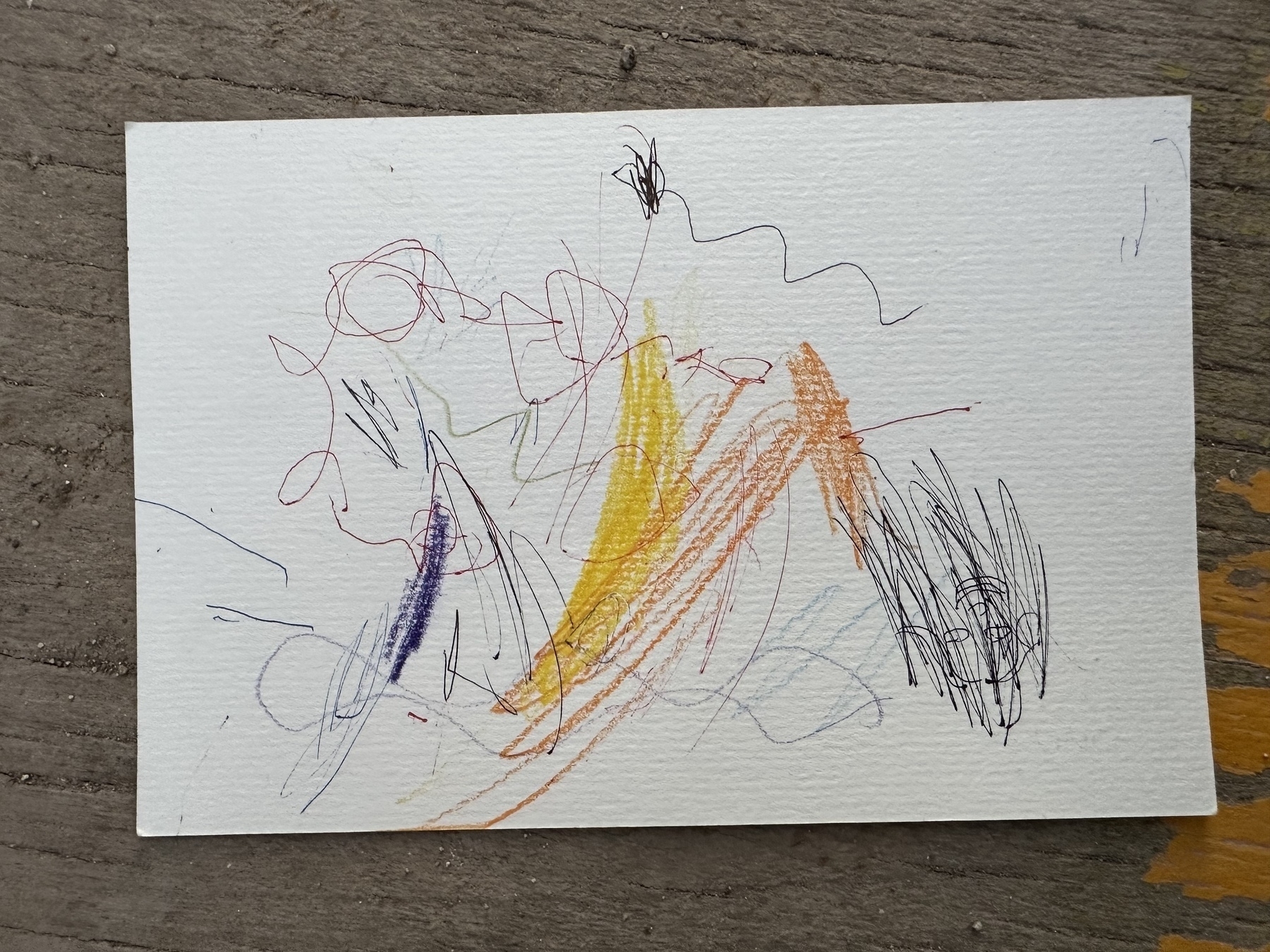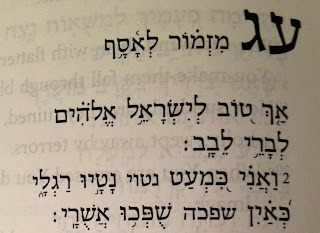art
Sketching with Daniela in Tikal
We sat on top of the ruins of a Mayan temple, watching the sun sink towards the western horizon. Tikal National Park limits the number of people who can take a sunset tour each day, and I wanted to offer my wife something special. So we hired a guide, hiked in, and climbed the steep wooden stairs to sit on the platform. As the sky slipped into its evening colors, a keel-billed toucan sailed past, just above the treetops.
The platform on top of Mundo Perdido can hold about thirty people comfortably, but I thnk we were closer to thirty-five. We sat shoulder-to-shoulder with one another, perched above the dense canopy. In front of us we could see the combs of Temple IV and Temple I rising above the trees. In this part of Guatemala the land is low and level, with slight ridges undulating across the forest.

The colors of the trees are a lesson in ecosystems. They’re not just green. Most of them are topped with various kinds of bromeliads, plants that don’t send roots down into the soil but that live in the air. The main function of their roots is to cling to the branches. The bromeliads collect rain in their leaves, and get their energy from the sun and the air. Bright green succulents, yellow and orange orchids, and red fronds all arise between the leaves and flowers of the trees and vines. The nearest trees have vibrant colors; each wave of trees into the distance is darker green, fading to blue and purple into the far horizon.
Unzipping the backpack at my feet, I pulled out my sketchbook and colored pencils. Looking to the North, I began to sketch the slowly changing colors.
To my left sat a family from Spain. A girl who was maybe three or four years old sat between her youthful parents. She glanced at my sketchbook and then asked her father, “¿Papá, tienes un bolígrafo?” “Daddy, do you have a pen I can use?” No, he replied.
I dug into my backpack and pulled out some more paper, and laid a sheet down on the wood in front of them, and put down a tri-colored ballpoint pen where the girl could reach it. “¿Quieres dibujar el bosque conmigo?” “Do you want to sketch the forest with me?” She looked at her parents, who nodded their approval, and she began to draw. Her parents looked at me with smiles, and watched their daughter draw. Soon she was frustrated that her sketch didn’t look the way she wanted it to, so I opened my pencil case in front of her and chatted with her about what colors we saw in the trees and in the sky. Each time we named a color, she took the appropriate pencil and drew some more. We continued that way for the next twenty minutes or so until the sun began to touch the horizon and it became both too dark and too brilliant to keep sketching. Together we all watched the sun blaze and shoot out rays above a small cloud before disappearing below the distant hills.

Before we parted that evening, I asked if I could take a photo of her art, telling her it was one of the nicest drawings I’d seen in a long time. She smiled and said I could.

The next day, while walking through the park again, we ran into the family and I asked her name. “Daniela,” she said. Daniela, I hope you had a wonderful time in Tikal, and I hope you keep making art. Thanks for sharing the moment with me!
Vertical Art
If I were more cynical I would imagine that the CEO of a search firm would like to limit civilian surveillance so that searches for visual information has to be channeled through a firm that specializes in searches. Fortunately, I am not very cynical.
Instead, I'm feeling quite charitable. Since I also recently read that piloting a drone is boring work, I think we should start new public art projects for the benefit of those doing surveillance. Until recently, we have viewed ourselves horizontally: we care about how we look from the ground, from eye-level. Maybe we should start to care more about how we look from the bird's-eye-level.
We could start with rooftop art, and move up to something like new Nazca Lines. Then all those drone pilots and satellite image analysts could have something more interesting to look at. Art is good for us. Rather than asking "who is watching the watchmen?" let's ask "what are the watchmen watching?" We should give them something worth seeing. I'm going to start by planting flowers.
 |
| Yeah, but what does the roof look like? |
All Your Deeds
The last line caused me some trouble, though. In it Asaph, the psalmist, says "I will tell of all your [God's] deeds."
Okay, what exactly are those deeds? What can we ever reliably say about God's deeds? If God had done something in history that were not open to historical doubt, there would be no atheists.
The tradition gives us stories about God, and a century of biblical criticism calls those stories myths. Still, as I have argued elsewhere (here, and here, for example) myth is not - or should not be taken as - a synonym for falsehood. Stories may be myths and true, even if not historically true.
As Howard Wettstein argues in his Significance of Religious Experience,
The Bible’s characteristic mode of ‘theology’ is story telling, the stories overlaid with poetic language. Never does one find the sort of conceptually refined doctrinal propositions characteristic of a doctrinal approach. When the divine protagonist comes into view, we are not told much about his properties. Think about the divine perfections, the highly abstract omni-properties (omnipotence, omniscience, and the like), so dominant in medieval and post-medieval theology. One has to work very hard—too hard—to find even hints of these in the Biblical text. Instead of properties, perfection and the like the Bible speaks of God’s roles—father, king, friend, lover, judge, creator, and the like. Roles, as opposed to properties; this should give one pause. (108, emphasis added)The stories may not be about historical "deeds" but may be about the character, the roles of God.
Which makes me wonder: what roles does God play in my life? What "deeds" may I speak of?
 |
| The preface to the complaint in Psalm 73 |
Before I reply, let me hasten to say this: I am often reluctant to write too strongly about this sort of thing because I do not want to say that others must believe what I believe. If God has led me to belief, (grant me that for the sake of argument for a moment) God has not strong-armed me into belief but allowed me to arrive at my beliefs over time, letting them be shaped by experience. I do not see why I should allow you less liberty than God has allowed me.
So I write the following admitting that I do not know what I am writing about. As Augustine confessed, when I speak of my love for God, I do so simultaneously wondering what I mean by "God." What can I compare God to? What is God like? I do not know how to answer those questions, except by telling stories, expositing roles. So here goes:
When I was a child, belief in God motivated a family in my neighborhood to care about me and to welcome me into their home when my family was falling apart. Without that love...I shudder to think what I would be today.
God gives me a name for what I pray to. God gives me a focal point for my attention in the vast cosmos, and God gives me a sense that in such a cosmos persons matter. And because persons matter, justice matters. This is not to say one cannot be just without belief, or that belief makes one just - far from it! - only that I find for myself the two ideas closely bound together.
God gives me solace in my mourning and hope when I pray. My mother is dead, but when I speak to God about her, she is not lost.
God gives me a story about the centrality of nurturing love. A reason to think all things are related. Someone to thank. Someone to be angry with. Rest for my soul. Quietness, and in it, trust.
God gives me a story about giving, and why giving and receiving should matter so much.
A story about why, and how, to turn a guilty conscience into repentance. A reason to forgive, and, very often, the strength to forgive. And to hope that I too am forgivable.
A reason to hope that no one is beyond redemption, beyond all hope, completely unworthy of love.
Belief that every person matters. More than that, belief that a teenage girl could be a vessel of the divine; that a third-world martyred prophet could save the world; that an inarticulate foreigner could be a world-historical lawgiver; that a persecuting zealot could get hit so hard by grace that he lives the rest of his life to preach good news for all people everywhere.
Hope that prison doors could be opened, that tongues could be loosed, that great art and great music might be signs of the divine.
I could be wrong about all of this, I know. I know there are other explanations of what I have written above. I also know those explanations apply to music, too, and I'm not interested in hearing about them there either if the reason for offering them is to help disabuse me of my love for good music. I know that people use the same word I use here to justify violence, self-interest, and hatred. I cannot help but feel angry and disgusted when it is used for those ends, ends which seem so contrary to what the word means for me, ends that make me think someone has read the wrong script, mis-cast the character, not known what deeds God has done.
They Know It When They See It
An inmate in the South Dakota State Penitentiary has been denied access to art-instruction books because they contain images of unclothed human bodies. (Original story here and here.) While not everything that could be called an art book is a good art book, shouldn’t we be doing everything we can to help felons improve their lives? And isn’t art one of the best things they can do while in prison? Let us grant the prison wardens their claim that pornography worsens prison conditions; does that mean that all nudity is obscenity? (Scroll down to the concurring position of Mr. Justice Stewart.)